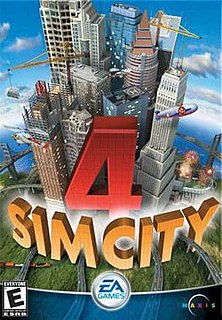 W
WSimCity 4 is a city-building simulation computer game developed by Maxis, a subsidiary of Electronic Arts. It was released on January 14, 2003. It is the fourth major installment in the SimCity series. SimCity 4 has a single expansion pack called Rush Hour which adds features to the game. SimCity 4: Deluxe Edition contained the original game and Rush Hour combined as a single product.
 W
WSimCity 4: Rush Hour is the expansion pack for SimCity 4 created by EA Games and Maxis, where the player builds a city from scratch. It was released on September 22, 2003, simultaneously with a deluxe edition of SimCity 4 which also contains the expansion pack built-in.
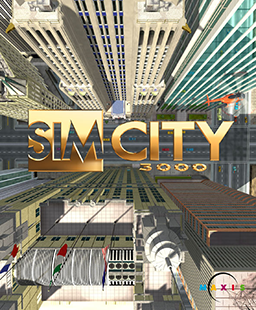 W
WSimCity 3000 is a city building simulation video game released in 1999, and the third major installment in the SimCity series. It was published by Electronic Arts (EA) and developed by series creator Maxis. It was released for Microsoft Windows, Macintosh, and, through an arrangement with Loki Games, Linux.
 W
WSimCopter is a 1996 flight simulator video game developed by Maxis. It puts the player into a 3D city. Like Streets of SimCity, SimCopter lets the user import SimCity 2000 maps into the game. It is also the first game to use the Sim language Simlish.
 W
WSimGolf is a video game created by Maxis in 1996. The game allows players to design their own golf courses and play them.
 W
WSimPark is a 1996 video game by Maxis. The object of the game is to cultivate and manage a successful park. Similar to SimTown, it is targeted more towards children than the average player. SimPark attempts to show the importance of ecological balance. It could well be considered a 'lite' version of SimIsle.
 W
WThe Sims is a strategic life simulation video game developed by Maxis and published by Electronic Arts in 2000. It is a simulation of the daily activities of one or more virtual people ("Sims") in a suburban household near a fictional city. Players control customizable Sims as they pursue career and relationship goals. Players can also use their Sims' income to renovate their living space, purchase home furnishings, or clothing for their household. Players can also choose to pursue a social and successful life.
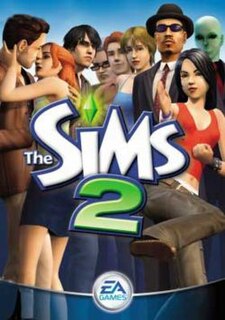 W
WThe Sims 2 is a 2004 strategic life simulation video game developed in Redwood City, California studio of Maxis and published by Electronic Arts. It is the sequel to the first game in the franchise, The Sims. The game allows the player to create their own Sim, neighborhoods, houses, and families. Players manage their Sims so they can experience rewards and form relationships in a manner similar to real life.
 W
WThe Sims Bustin' Out is a video game that was released in 2003/2004 for the PlayStation 2, Xbox, GameCube, Game Boy Advance, & N-Gage. It is the second title in The Sims console series and the first The Sims title not released on Windows PC. It featured the same 3D environment and engine the past game did, however adds several features from The Sims expansion packs: Livin' Large, House Party, Hot Date and Superstar. As the title suggests, Sims can get out of the house to visit other locations such as Shiny Things Lab or Casa Caliente. There are two modes: Bust Out Mode, which has mission-based gameplay and Freeplay Mode, which is open-ended gameplay very much like the original The Sims PC game. The PlayStation 2 version once featured the option to play online. However, it was shut down on August 1, 2008.
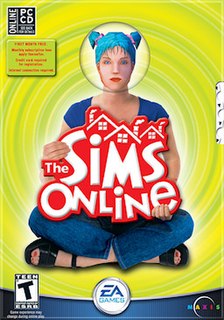 W
WThe Sims Online, also known as EA-Land, was a massively multiplayer online variation on Maxis' computer game The Sims. It was published by Electronic Arts and released in December 2002 for Microsoft Windows. The game was sold in retail stores in North America and Japan and could also be downloaded worldwide through the EA.com online store, though the game was English-only and had no official translations. The game charged a subscription fee of US $9.99 per month. In March 2007, EA announced that the product would be re-branded as EA-Land and major enhancements would be made. About a year later, EA announced that the game would shut down all activity on August 1, 2008.
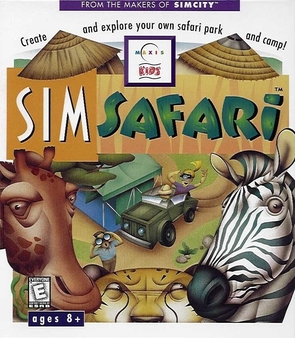 W
WSimSafari is a construction and management simulation game released by Maxis on March 19, 1998. It is similar to SimPark, except that the park is set in Africa rather than in North America, and therefore has African animals and plants.
 W
WSimTunes is a children's software toy designed by Toshio Iwai and released by Maxis in 1996. It involves painting a picture using large pixels, where each color represents a musical note. The player places up to four different-colored Bugz, which represent musical instruments or vocal syllables, on this picture, and can change their starting directions and relative speeds. The Bugz crawl over the picture, playing notes corresponding with the colors; and they turn, move randomly, or jump in response to function symbols that can be added to the dots.
 W
WStreets of SimCity is a racing and vehicular combat 3D computer game published by Maxis and Electronic Arts in 1997. The game features the ability to visit any city created in SimCity 2000, as well as a network mode, allowing for players to play deathmatches with up to seven other players. It is the last Maxis game to be developed and released without supervision by Electronic Arts, which acquired Maxis in the two months leading up to release.
Supercross 2000 is a racing game based on the motorbike racing sport of supercross. It was by EA Sports for the PlayStation and Nintendo 64 consoles in North America on October 31st, 1999.
 W
WTony La Russa Baseball is a baseball computer and video game console sports game series (1991-1997), designed by Don Daglow, Michael Breen, Mark Buchignani, David Bunnett and Hudson Piehl and developed by Stormfront Studios. The game appeared on Commodore 64, PC, and Sega Genesis, and different versions were published by Electronic Arts, SSI and Stormfront Studios. The artificial intelligence for the computer manager was provided by Tony La Russa, then manager of the Oakland Athletics and later the St. Louis Cardinals. The game was one of the best-selling baseball franchises of the 1990s.